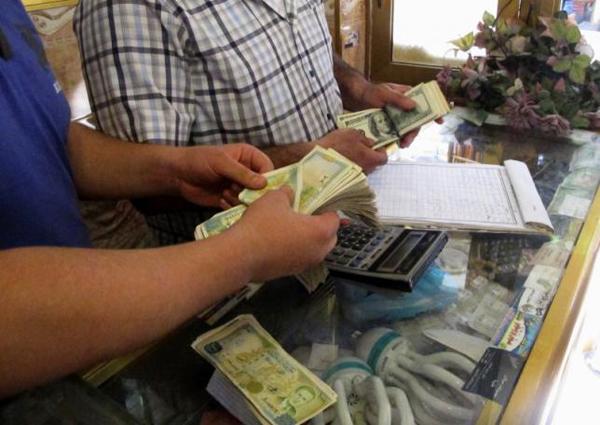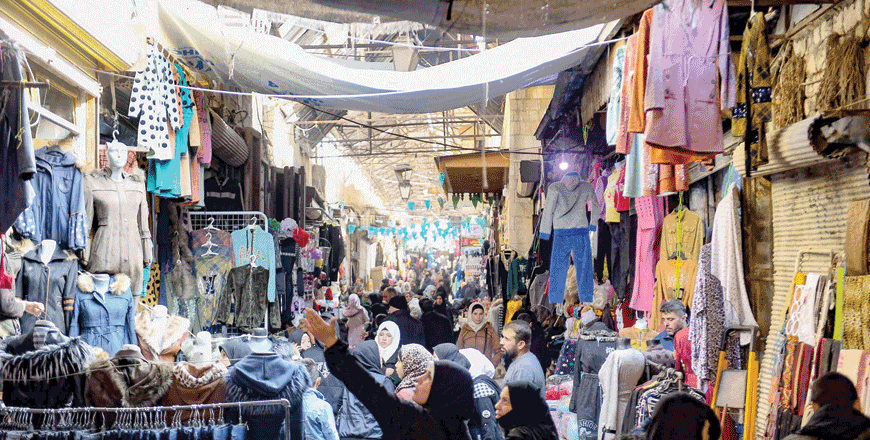You are here
Syria's war-battered pound hit by Russian withdrawal
By Suleiman Al Khalidi , Reuters - Mar 19,2016 - Last updated at Mar 19,2016

Money changers count Syrian pound notes and US dollars at a currency exchange shop in Aleppo's Bustan Al Qasr district, September 9, 2013 (Reuters photo)
AMMAN — Battered by war which has inflicted incalculable damage on industry, infrastructure and economy, Syria's currency hit new lows last week after Russia said it was reducing its military support to President Bashar Assad.
The Syrian pound has fallen to 475 to the dollar on the black market, a 90 per cent drop since March 18, 2011, when security forces fired on protesters in the city of Deraa, sparking an uprising which descended into civil war.
Backed by financial and trade support from Iran, Syria's government succeeded in stabilising the pound early in the conflict.
But the slide accelerated as it lost control of territory and border crossings, trade collapsed, Western sanctions bit, Gulf Arab investment dried up, major cities were devastated and half the population was displaced.
The collapse of the currency has driven up inflation and aggravated wartime hardship, as Syrians struggle to afford basics such as food and power. Government budget spending in pounds has more than doubled, but in dollar terms has crashed.
Russia's surprise military intervention in September turned the tide of war in Assad's favour, but only briefly stemmed the currency's decline, and Moscow's declaration on Monday that it was pulling forces out of the country hit the pound again.
Panic
"In the last few days it came under further pressure because of the Russian announcement," a Damascus-based businessman said. "There was a lot of panic."
At the start of the uprising, the pound was around 47 to the dollar.
"Today, the [official central bank] intervention rate is around 406 but it reached 475 pounds in the black market," Hani Al Khoury, a financial consultant based in Damascus, said late on Thursday.
He said official efforts had prevented an even graver depreciation.
"Compared to the extent of the crisis and its devastating impact on the economy, the pound could have been far more affected," he told Reuters by telephone.
Infusions of money from Iran and dollar remittances from Syrians working abroad have also helped prevent an even steeper freefall, bankers say.
Iran is believed to have deposited hundreds of millions of dollars in the country's depleted reserves.
The government has also clamped down on currency exchanges in an effort to narrow the gap between official and black market rates. But in recent weeks, the official rate has fallen as fast as the black market, showing the limits of central bank influence.
Dollarisation
The pound's fall has pushed Syrian traders to switch their financing increasingly into foreign currency, Khoury added, a trend which may have been accelerated by the flows of billions of dollars of international humanitarian aid into the country.
"The Syrian economy has been dollarised — the import side and the financing side, along with savings and the aid coming from outside," he indicated.
That, combined with the continued pressures caused by the war, meant that whatever steps authorities take, the pound "is bound to continue to gradually drop".
"In every street in Damascus there is a different rate," the Damascus businessman said. "In Homs, Aleppo, Damascus, the black market rate varies."
He held out little hope of recovery for the currency without an end to hostilities. "Can you say whether the Geneva peace talks will succeed, or whether the armed groups will stop fighting?" he said.
Recently, Syrian businesswoman Reem Abu Dahab displayed her workshop's lacy pink and white nightgowns at a stall in a Beirut exhibition hall hoping to attract increasingly elusive buyers.
Syria's textile industry was once one of the country's economic bright spots, with its products coveted throughout the region and beyond.
But the sector, like the economy in general, has been devastated by the war that erupted in March 2011, with factories destroyed, workers displaced and sanctions hampering trade.
The migrant crisis and outflow to Europe have also depleted its workforce.
"Buyers used to come from all around the world but the war has scared them and now very few come to Syria," said Abu Dahab, surrounded by products made in a small workshop in Damascus.
Abu Dahab's family once owned a factory in Harasta, a Damascus suburb ravaged by fighting between rebels and the regime.
But it was completely destroyed in the war, and now the business is run out of a small workshop in the capital.
"We had 100 employees, today only 30 of them are still working for us," said Abu Dahab, who was one of around 100 Syrian textile manufacturers at a trade fair set up in Beirut.
Before Syria's conflict began, textiles represented some 63 per cent of the industrial sector's total production.
The sector was worth 12 per cent of gross domestic product (GDP), employed a fifth of the workforce and exports netted around $3.3 billion (3 billion euros) a year, according to the Syrian Economic Forum think-tank.
But by 2014, private sector textile exports had fallen by half, with the industry particularly affected by fighting in Aleppo city, the country's former commercial hub and home to many textile factories.
Factories destroyed, workers gone
"Seventy per cent of [textile] factories were closed or destroyed by the war," said Feras Taki Eddine, president of the Syrian Textile Exporters Association, next to a mannequin in black underwear and stockings.
In addition, many businesses lost machines and employees.
"Some of the machines were destroyed and some were stolen. Thieves took them to Turkey. I had 220 machines before, now I only have 10," said AlaaAldeen Maki, owner of Dream Girl Lingerie, an Aleppo-based business.
"Most of my employees emigrated because of the situation and some because they were forced to join the army for military service," he added.
When the war arrived in Aleppo in mid-2012, eventually dividing the city between government control in the west and rebel control in the east, some businesses relocated to small workshops in the city's safer areas.
Others, based in the relative safety of Damascus, have done whatever they can to survive.
Muhanad Daadush owns the country's biggest lingerie and pyjama factory, located in the capital.
He still employs 450 people, many of who sleep in the factory during upticks in violence.
"I had 72 workers sleeping at the factory" at one point, he told AFP at his stall, surrounded by bras of all hues and comfortable cotton sleepwear. "They started at six in the morning, worked until 11, then slept. They would only go home to their families from Thursday night to Saturday morning."
'Still alive'
For all its challenges, Syria's textile industry continues to enjoy a reputation of quality in the region, and the Beirut fair attracted some 500 buyers, mostly from the Middle East.
Fadi Baha was in town from Egypt, where he owns a chain of stores.
"I buy Syrian textiles because of their quality. It's better than Turkish or Chinese merchandise and almost competitive price-wise," he told AFP. "I like how Syrian manufacturers create a unique mix between Eastern and European styles."
But while regional buyers continue to purchase Syrian textiles, clients from further afield were nowhere to be seen.
Daadush Lingerie once exported 70 per cent of its products to Europe, but its owner said only 10 per cent now goes there.
And the rising costs of production, difficult trading environment and shrinking workforce, all mean competitors from Turkey and China are increasingly able to pinch clients from Syria's textile industry.
Manufacturers blame shrinking exports in part on sanctions slapped on Syria after the government began its crackdown on dissent following anti-government protests five years ago.
TakiEddine said Europe should be bolstering trade with Syria to keep citizens at work in their home country.
"It should be in Europe's interest to facilitate trade, because Syrian workers without jobs now want to leave to Europe," he added.
Several vendors said they were committed to staying open, ensuring jobs for Syrians and the industry's survival.
"It's important for us to show that Syrian industry is still alive," said TakiEddine.
Related Articles
Syria's entrepreneurs, suffering from crippling losses after four years of civil war, have launched a drive to encourage consumers hit by burgeoning inflation and a shortage of imports to "buy Syrian".
DAMASCUS — The value of the Syrian pound plunged on Monday to nearly 10,000 against the dollar on the black market, websites monitoring the
DAMASCUS — Syria's nose-diving pound hit a new record low Saturday against the dollar on the black market, according to websites monitoring

















